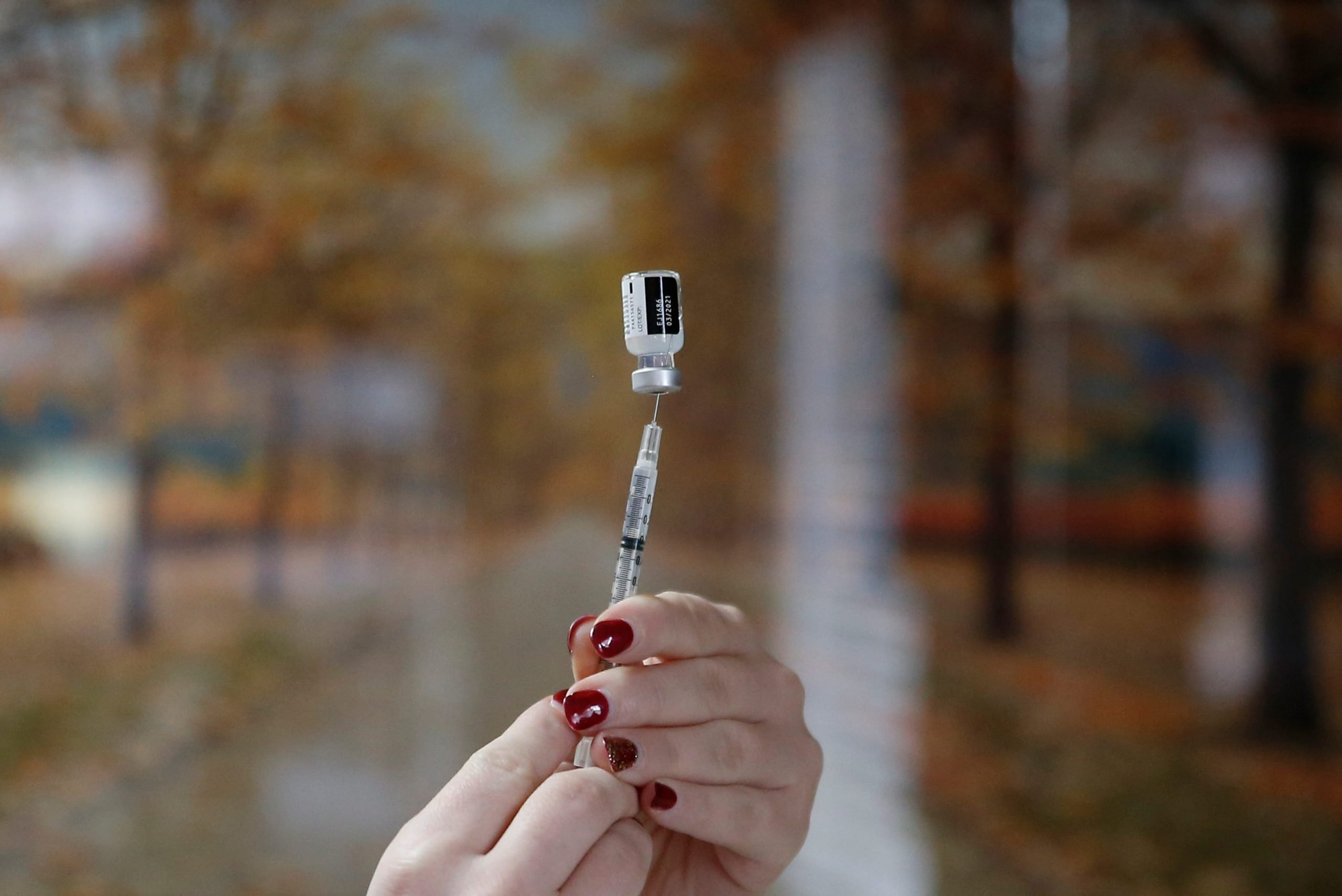
- Getting COVID-19 while pregnant puts you at higher risk of severe disease and death from the virus.
- The vaccine hasn't led to increased risks among the 30,000 vaccinated pregnant women being tracked.
- COVID-19 and the vaccine can lead to symptoms, but the virus's can be longer-lasting and severe.
- See more stories on Insider's business page.
Risk getting COVID-19 – or accept the unknown risks of the COVID-19 vaccine? That's the question many pregnant people are asking.
On the one hand, while most people who contract COVID-19 in pregnancy end up doing fine and delivering healthy babies, they're still at higher risk for hospitalization, ICU admission, and even death than infected non-pregnant women.
On the other, the coronavirus vaccine may come with its own risks, most of which are unknown since pregnant people weren't enrolled in the clinical trials that led to the vaccines' emergency-use authorization. (A trial looking at the Pfizer vaccine in this population is underway.)
But based on what we know so far, the risks of getting COVID-19 in pregnancy seem to outweigh the potential risks of the vaccine. Here's a breakdown showing why.
COVID-19 in pregnancy is linked to serious complications
If infected, pregnant people are at increased risk for serious complications when compared to nonpregnant women with the disease, a November report out of the Centers for Disease Control and Prevention – the largest of its kind to date – found.
The analysis looked at data from about 400,000 15- to 44-year-old women who had symptomatic COVID-19 between late January and early October. They found that pregnant women with COVID-19 were nearly four times as likely to need ventilation and twice as likely to die than nonpregnant women with COVID-19 of the same age.
COVID-19 in pregnancy is also linked to an increased risk of preterm delivery.
The overall risks for COVID-19 complications in pregnancy were low: 1.5% of pregnant women went to the ICU, 0.29% needed ventilation, 0.07 required life support, and 0.15% died.
A study presented in January 2021 including 1,200 infected pregnant women across 33 US hospitals found that the 12% with critical or severe symptoms tended to be most at risk for complications and death, and were also more likely to have other risk factors like a higher body mass, asthma, diabetes, and hypertension.
Getting a COVID-19 vaccine during pregnancy is not linked to complications or worse side effects
By contrast, there is no evidence of the COVID-19 vaccine leading to death in anyone, pregnant or not. And pregnant women in particular haven't suffered any worse side effects from the vaccine than in non-pregnant women, according to the latest CDC vaccine safety report, published March 1, which includes over 30,000 vaccinated pregnant women.
There hasn't been an uptick in pregnancy-related complications, like stillbirth and miscarriage, among pregnant women who've gotten the shot, either.
"We do have science that clearly indicates that vaccination does decrease disease process, disease progression, and death," OB-GYN Dr. Jessica Shepherd told ABC. "Risk vs. benefit, in the end at this point, is transmission and death vs. protection."
COVID-19 can cause long-term symptoms
Pregnant or not, getting COVID-19 can mean experiencing any number of side effects, from a mild fever and aches to debilitating fatigue, shortness of breath, heart palpitations, and a loss of taste and smell.
While most people recover after a few weeks, research suggests about 10% become "long haulers," or people whose symptoms last months - or now, even more than a year - after their initial illness has passed and they test negative.
Long-haulers often grapple with fatigue, body aches, difficulty sleeping, and mental health issues including delirium, anxiety, and brain fog or memory loss.
The vaccine can lead to short-term side effects
The available COVID-19 vaccines, by comparison, can come with side effects, though they're usually mild and last only a day or two.
Some of the the most commonly reported side effects, usually among women, include headaches, fatigue, chills, nausea, and dizziness, according to a January CDC report analyzing safety data on the nearly 13 million people who'd received a vaccine.
In about 1% of people, the vaccine leads to a fever, which, if persistent and above 102 F, can raise the risk of birth defects and miscarriage in the first trimester. For that reason, experts at the University of Massachusetts Medical School - Baystate say it's reasonable to delay your vaccine until you're past 12 weeks' gestation.
However, that is not an official recommendation. The American College of Obstetricians and Gynecologists says a fever can be treated with Tylenol, which is safe in pregnancy and doesn't seem to affect how the vaccines work.
We still need more data on the shot in pregnant people
Researchers don't have clinical trial or long-term data on the vaccine risks to pregnant people, though research is underway.
"Based on how the [Pfizer and Moderna] COVID vaccine works, there should be very little risk to a developing baby," Dr. Jessica Madden, a pediatrician and neonatologist who serves as medical director of Aeroflow Breastpumps, told Insider. That's because, like the flu vaccine, the coronavirus vaccines are do not contain live virus.
"The mRNA in the vaccine acts locally, in the muscle cells surrounding the injection site," she said. "It cannot enter into cells' nucleus, thus it has no effect on DNA. "Plus, limited data from animal studies haven't revealed any harms during pregnancy."
Harvard experts say the Johnson and Johnson vaccine, which is not made from mRNA but rather a harmless form of the common cold virus called adenovirus, should also be safe in pregnancy, though clinical trials still need to be conducted.
The modified adenovirus can't can't replicate or cause illness, did not affect pregnancy in animal studies, and similar vaccines that have been tested in pregnancy haven't yielded any negative pregnancy outcomes.

Ultimately, in the states where pregnancy makes you eligible for the vaccine, it's up to women to decide if they want it, with or without the consultation of a healthcare provider.
ACOG says the decision should be informed by transmission rates in the community, as well as the individual's risk of severe disease from COVID-19.
A pregnant person's occupation and pregnancy complications matter too. It makes more sense, for example, for a pregnant bus driver in a city with high coronavirus rates to get the vaccine than someone who works from home in a small town where transmission is low. Likewise, a pregnant person with gestational diabetes would benefit from the vaccine more than one with a low-risk pregnancy.
Whatever you choose, Madden said, "you should feel like your decision is respected, and please know that if you choose not to get the vaccine right now, or in the future, that it is OK."
